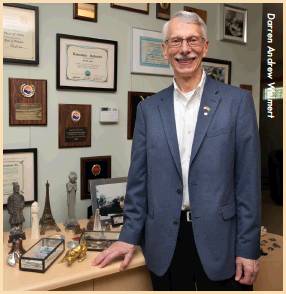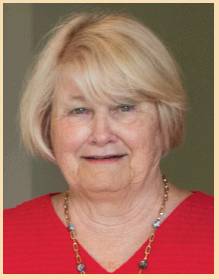The Right Time to Retire?
Beyond finances, there’s one thing you’ll need for a successful retirement: a plan for finding your fulfillment.
By Holly Riddle
From Adult Transitional Care
eciding to D retire is
one of the
biggest steps
a person can
make in their career and, obviously, there’s a lot of financial planning that’s involved in deciding when and how to retire.
“We start with basically looking at what the current standard of living is [and] looking at what their current income-generating capacity is,” explains David Panko, of Panko Wealth Management, “and then looking at how far that reaches into the future in terms of their ability to support their current lifestyle. We know that, actuarily, we live about 87 years, and so the bottom line question is, can they maintain their current lifestyle for the remainder of their life or until they’re about 87 years old.”
However, finances aren’t the only thing worth considering before taking the plunge from full-time employment into retirement. While money certainly keeps the lights on, it’s not the only thing that’s going to keep a retiree happy for the next twenty to thirty years of their life, as both recent retirees and Panko, through his experience with many clients, can attest.
Finding Your Personal Fulfillment
As Panko notes, some of his clients base their decision to retire (or not to retire) on where they find their fulfillment in life.
“I have a client who was a Penn State employee and [who] really was burned out, and it was clear to her and clear to me that her life was not as joyful as it could be. So, she chose, because of her life goals, to retire early. I think for some people, that’s the determining factor [on when to retire],” says Panko. “That’s what I recommend to all of my clients, is to look for the joy in life. And if your job brings you joy, then by all means there is no real reason to retire. My job brings me a tremendous amount of joy and I have no desire to retire.”
Don’t have anything in particular that brings you joy outside your career? If you plan on retiring in the near future, it might be time to start looking for personal fulfillment elsewhere.
Panko provides another example: “My college roommate, a very, very dear friend, retired. He was a captain for an airline, and he was very severely depressed because he couldn’t fly. He wanted to fly, but [airlines require] mandatory retirement at age 65. … He really, really struggled. … He’d found so much joy in being a captain and, in a single day, it was all taken away from him. And so I find that he’s the perfect example of having retired too soon and not having other things to occupy his time.”
It’s advice that recent retiree Mary Lou Bennett acknowledges as well. A Realtor since 1973 and retired in July 2020, Bennett, when asked what she would tell a friend considering retirement, says, “I will use the advice that my late husband always said. He said he would never retire until, one, [work] wasn’t fun anymore and, two, he didn’t know exactly what he was going to do the next day.” She says she’s witnessed multiple friends retire early with no plan for what they might do after retirement. “You end up just being really unhappy. … I don’t think most people can just retire after a long career and not have some idea of what they’re going to do with their time.”
While Bennett retired during the pandemic, somewhat limiting her ability to use up her retirement days to her full advantage, she does say that she’s been able to slow down and enjoy the little things in life more so than she did while working.
“Once I retired, I was able to look out the windows and see nature that I hadn’t [noticed before]. I’m sure that, every spring, flowers bloomed and the birds came, but I was always too busy to notice that until the last spring,” she notes.
Going With Your Gut
Recent retiree Mark Brackenbury, previous editorial director at Town&Gown planned a more gradual transition into retirement after more than 30 years in the publishing industry.
“In early 2019, I went part-time at Town&Gown … so it’s been a gradual process,” he explains. “This spring, I decided to take the full plunge into retirement.
“I don’t think most people can just retire after a long career and not have some idea of what they’re going to do with their time,” Bennett says.
It was really just to have more time, after 38-plus years of working a pretty heavy schedule. It’s just like, ‘All right, it’s time to do stuff for us now.’” Since retiring this year, Brackenbury has enjoyed traveling and plans to spend more time with his grandchildren in Virginia and Connecticut. He also plans to retain his connection to the publishing world with a little freelance work.
Brackenbury does, however, mention one concern that seniors may want to consider as they approach retirement: the emotional change of moving from a high-pressure role to the no-pressure retirement lifestyle. “It was like, ‘Wow, can I really do that? Can I really take that plunge?’” he says. “After thinking about it a long time, I decided, yes, I’m ready to do that.”
Ultimately, Brackenbury advises professionals approaching retirement to “go with their guts.”
“For a few years, my gut was telling me it was getting to be time and, this year, we just said, ‘Why not now? This is as good a time as any; let’s just pull the trigger and do this.’ So, beyond the finances, if you feel comfortable that you can do it, follow your gut.”
Looking Forward to Fun
Think you’re still a few years off from retirement? Finances aside, it may already be time to start planning how you’ll spend your retirement days. Panko recommends his clients have an idea of how they’ll find their fulfillment and spend their time postretirement up to a year and a half in advance.
“Interestingly, people get bored playing golf every single day,” he laughs. “Now, if you want to play twice a week, that’s good. But most people don’t want to play every single day. So how will you spend the other days if you’re not on the golf course? How will you spend days if it’s raining? Well, have that plan in place a year, a year and a half before you actually retire, so that you know how you’re going to spend your time.” T&G
In a year with a global pandemic significantly limiting social interaction, technology became more important than ever, especially for older adults. New research from AARP found that more older adults (44 percent) view tech more positively as a way to stay connected than they did before COVID-19.
The National Council of Aging recommends making communication a priority. Some older adults go days without speaking to anyone at all. Unfortunately, this is especially common for seniors who struggle with poor health and who have limited mobility or transportation options.
“Loneliness amongst the older population will be a much more insidious cause of casualty than we previously realized,” says Matthew L Russell, MD, a geriatrician and palliative care specialist at Massachusetts General Hospital.
Although face to face visits may still not be possible there are ways to stay connected. Throughout the pandemic, all populations have been leaning on technology more than ever as tools for socializing with friends and family. As a result, many seniors have learned to adopt evolving technology, which they may not have prior to COVID-19. This is not ideal and doesn’t replace the in-person human interactions but may be all that is available for your loved one at this time. Take time to schedule virtual visits with friends and family which can be done with Skype or Zoom or FaceTime. It is recommended that a regular time and day be set aside each week so your loved one has something to look forward to. There also may be additional family and friends who would like to join the conversation and it is helpful for them to be informed of the scheduled time so they can participate in the virtual visits. Many seniors enjoy emails and you may find that not only do they connect with you but they are also connecting with their friends and neighbors.
Consider playing your favorite games online, like cards or board games. There are APPS to download where many of these games could be played. Joining an online discussion group for seniors or joining an online book club are other ways for seniors to stay connected. If you have a caregiver visiting your loved one, ask them to help set up these alternate methods of communication. These can be set up on computers, laptops, smartphones, iPads, or tablets.
If you do not have access to smartphones or computers, communicate through letters or cards to loved ones. Have grandchildren draw pictures and send them to your loved one. Telephone calls are always welcome and comforting. Another option is having a phone tree so members of the family, friend group, or social group can stay in touch. It is not easy for anyone right now, especially the senior demographic.
Adult Transitional Care provides Personal Care, Residential Management and Move Management services. Our passion is to help you maintain a high quality of life. We help you generate a positive outlook as you successfully adapt to the multiple challenges of many transitions, including the aging process. We partner with you to achieve a high level of physical, psychological, social, and spiritual wellbeing. For more information and learn how we can help call (814) 954-2821 or visit our webpage at adulttransitionalcare.com. T&G




